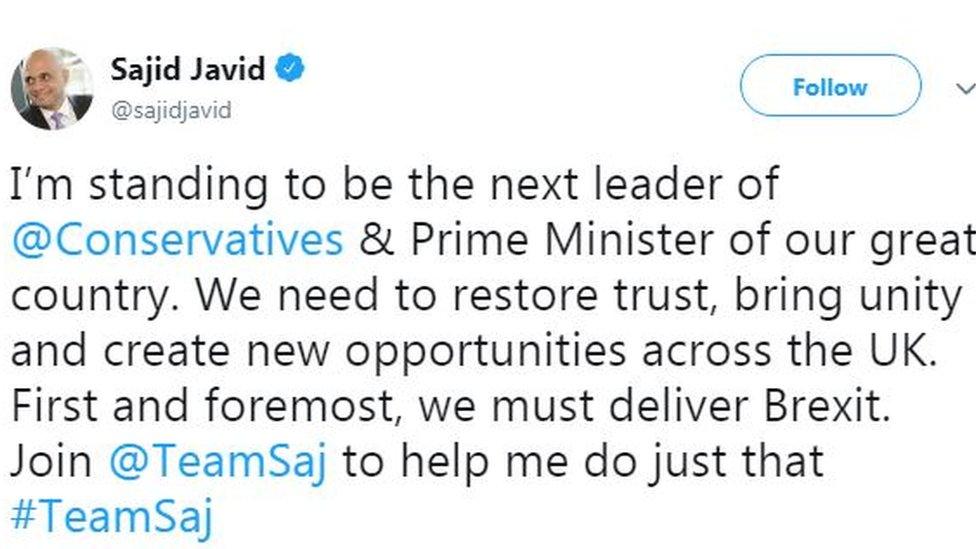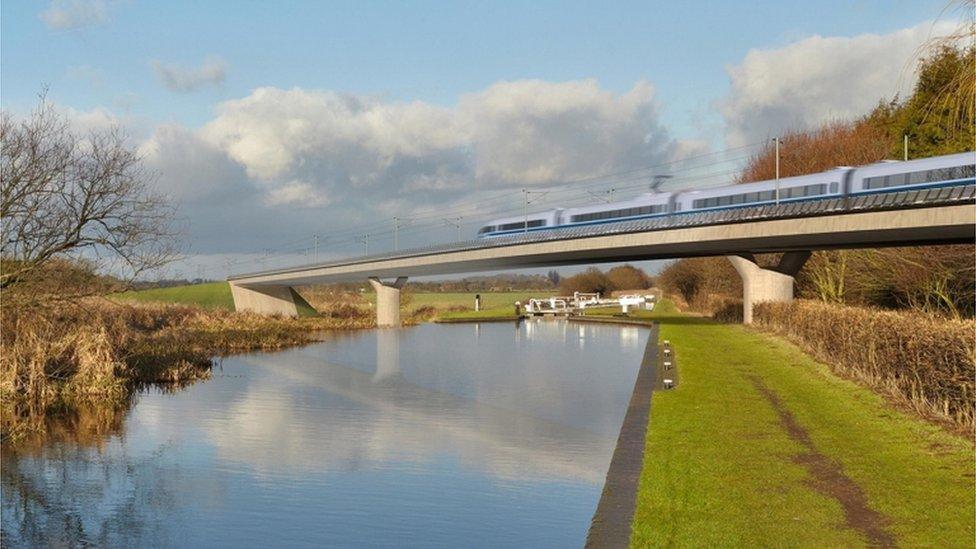Will Bromsgrove MP Sajid Javid be our next PM?
- Published

Surprise surprise!
It was the tweet that everyone had been expecting. It is certainly not for me or anyone else in my line of business to express any preferences for any of the Tory leadership candidates over any of the others.
This contest revolves around the innermost machinations of the Conservative Party. But we do have an obvious interest when someone based in our part of the country is bidding for the highest political office in the land.
Sajid Javid, home secretary and MP for Bromsgrove in Worcestershire, is indeed running for the leadership of the Conservative Party and, thus, the keys to Number 10. And yet it is still somehow surprising that his declaration should have seemed so unsurprising that its arrival seemed almost routine.
Perhaps we need to remind ourselves just how much new political ground he is hoping to break.
His personal back story, in itself, would stand out sharply in the history of Conservative party leaders: the comprehensive school-educated son of a bus driver who grew up in the flat above his family's shop, and went on to forge a top flight transatlantic banking career.
He was also instantly recognised by the former Labour Foreign and Home Secretary Jack Straw as one of the brightest sparks in the Conservatives' 2010 intake.
Beyond this, though, a Javid premiership would strike a particular resonance in 21st Century Britain, especially in areas like ours with a diversity of multicultural communities.
Although he is not a practising Muslim, he would be Britain's first prime minister to emerge from our British Pakistani Islamic tradition. So this contest will be closely watched to establish just how much of a problem the Tories have with Islamophobia in their own ranks.
What's more, he would be the first prime minister with a Midlands constituency since Sir Anthony Eden, the ill-starred Conservative MP for Leamington Spa, who was in Downing Street between 1955 and 1957; and the Conservative MP for Bewdley, Stanley Baldwin, who served as prime minister for no fewer than three separate terms: 1923-4, 1924-9 and 1935-7.
Home Office 'political graveyard'?
If he wins, Mr Javid would also help to dispel the myth that the Home Office is a ministerial graveyard where so many political ambitions lie buried: battered by events often beyond their control but which stick to their reputations like glue, you can see why the department has earned its formidable reputation.
And Mr Javid has indeed had his share of flak, battling to limit the damage of the Windrush scandal; the perennial 'hot button' issues surrounding immigration in general and net migration in particular; widespread criticism of his decision to strip Shamima Begum of her UK citizenship; and, of course, police numbers and the grim rising toll of knife crime. And so the list goes on.

Mr Javid faced criticism for his decision to strip Shamima Begum of her UK citizenship
Now, though, he is bidding to be the second successive prime minister to move directly from home secretary to the top job.
What does he stand for?
In the run-up to the Referendum in 2016, he told me he was "a reluctant Remainer". He will hope the calculated equivocation will enable him to reach for support from both sides of this epic Brexit debate.
His willingness now to countenance the idea of a no-deal Brexit if further negotiations prove either impossible or unavailing may appeal to some of those local Conservative activists who are seething about the failure to deliver Brexit on time, especially here in the region which delivered the biggest proportion of Leave votes.
But it may be a tougher sell to those in our major manufacturing areas, in industries such as the automotive sector, with its integrated supply and sales arrangements between Britain and the rest of the EU.
His commitment to "rebuild trust" between politicians and electorate is clearly aimed at the disconnect between Westminster and people in parts of the Midlands which he says "feel left behind" and where Parliament's failure to deliver Brexit is widely considered a breach of faith.

Mr Javid is a supporter of the HS2 high-speed rail project
After last month's European elections, Mr Javid wrote in the Daily Telegraph that voters had issued "a crushing rebuke" to the Conservatives who "could be fired from running the country". No wonder he dismisses outright any talk of another referendum or a general election.
But perhaps his most eye-catching proposal for those of us outside London is his recommendation of a £100 billion fund, to be based outside the capital and at arm's length from the government, to invest in the "creaking infrastructure", creating new well-paid jobs, improving transport links and connectivity across the UK.
It follows that he is a strong supporter of high-speed rail, despite mounting evidence of escalating costs which have prompted leadership rivals including Andrea Leadsom to demand a rigorous examination of its value for taxpayers' money.
If Mr Javid's is one of the two names eventually selected by MPs to go forward to the party's 165,000 members for the final vote, his support of HS2 could be a high-risk strategy, considering the strength of opposition to the project in 'Tory shires' like Staffordshire and Warwickshire.
I'll be asking Mr Javid about that, and much else besides, in this weekend's Sunday Politics Midlands in our usual 11.00 slot on BBC One this Sunday 16th June 2019.
But with this many contenders crowding into the parade ring, many fences have yet to be jumped before we reach that final furlong in six weeks' time.
